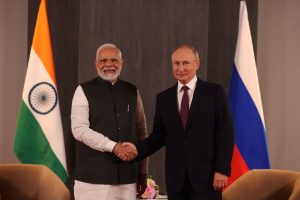Indian Prime Minister Narendra Modi’s presence at last week’s Shanghai Cooperation Organization (SCO) summit in Uzbekistan was awkward for many reasons.
For one, this was the first time that Modi and Chinese President Xi Jinping were coming face to face since their troops clashed in the Himalayas two years ago. Second, Xi and his Russian counterpart Vladimir Putin are rapidly fashioning the SCO into a bloc that dilutes Western economic hegemony, even as Washington and its allies target them with sanctions. This year, Iran was finally made a member, and Belarus — Russia’s close ally in the Ukraine war — is reported to be next in line.
India, on the other hand, is a part of the U.S.-led Quad coalition and many in Washington consider New Delhi to be an ally at least on paper. What was Modi doing there, hobnobbing with the West’s rivals and shaking hands with Putin in the midst of an invasion, many in Washington might ask.
To be sure, India has had long-standing troubles with China and more recent troubles with Russia, making this forum somewhat uncomfortable for New Delhi.
The India-China border conflict now appears increasingly intractable. In the aftermath of the 2020 clashes, the two sides have taken several steps to disengage and de-escalate, but that has only made it all the more impossible for New Delhi to ever reestablish the pre-2020 status quo.
In Uzbekistan, Modi appeared to be well aware of the domestic political implications of that problem. On the sidelines of the SCO summit, Modi met as many as four of his counterparts bilaterally — including even Turkish President Recep Tayyip Erdogan, who got into a prolonged tiff with India after criticizing New Delhi’s decision to revoke Kashmir’s autonomy in 2019. But he decided to skip a meeting with Xi and reportedly did not even greet him.
Meanwhile, although India has continued to maintain its neutral stance on the Ukraine war, Russia’s more recent struggles in that country are making it increasingly difficult for Modi to back Putin even through neutrality. In his bilateral meeting with the Russian president, Modi chose to address the war in the strongest terms yet, haranguing Putin on how “today’s era is not an era of war.”
Yet, despite these troubles, insofar as the global order is concerned, Modi now shares more common ground with Putin and Xi than he does with U.S. President Joe Biden, and the SCO is a useful platform for that purpose.
At last week’s summit, for instance, Xi called on SCO member states to expand the use of their own local currencies to settle trade and develop better systems for cross-border payment. That is already being explored by India, which shares with Beijing and Moscow the concern that the U.S. is increasingly weaponizing the dollar. Earlier this year, India’s central bank, the Reserve Bank of India, allowed the country to trade in the rupee. That move could help India trade with countries that are under U.S. sanctions — including Iran and Russia.
For the most part, these moves are aimed not only at countering Western hegemony but also upholding a state-centric global order, even as Biden revives talk of human rights and liberalism on the world stage. In his speech, Xi alluded to the importance of “[opposing] interference in other countries’ internal affairs.” Putin backed that up by speaking of “respect for each other’s sovereignty, national values and interests.”
These words are not entirely dissimilar to those used by New Delhi on various occasions — especially when it has sought to counter criticism from Washington over its “internal affairs.” In a wide-ranging speech late last month, India’s foreign minister Subrahmanyam Jaishankar spoke of the need for a multipolar order that would accommodate differences in values across countries — “distinct regions, specific cultures” as he put it.
In the context of the SCO’s efforts to extend its membership to countries sanctioned by the West — such as Iran and Belarus — it is significant that Modi touted the SCO last week as a forum for economic cooperation. For India, the SCO is fast becoming a platform to make common cause with China and Russia on issues of global governance. That strategic convergence may make irritants such as the Himalayan border more manageable in the long run.

































